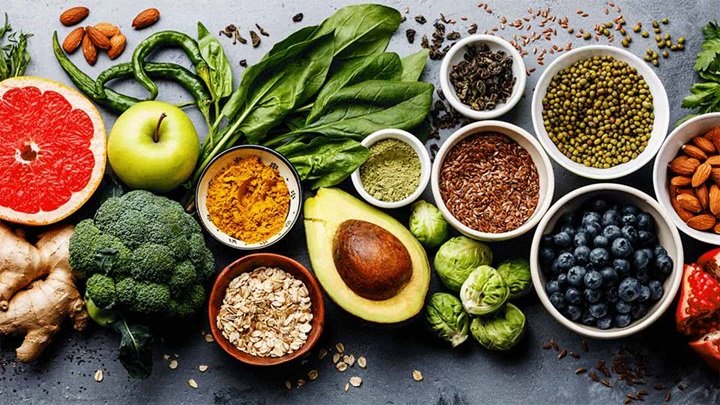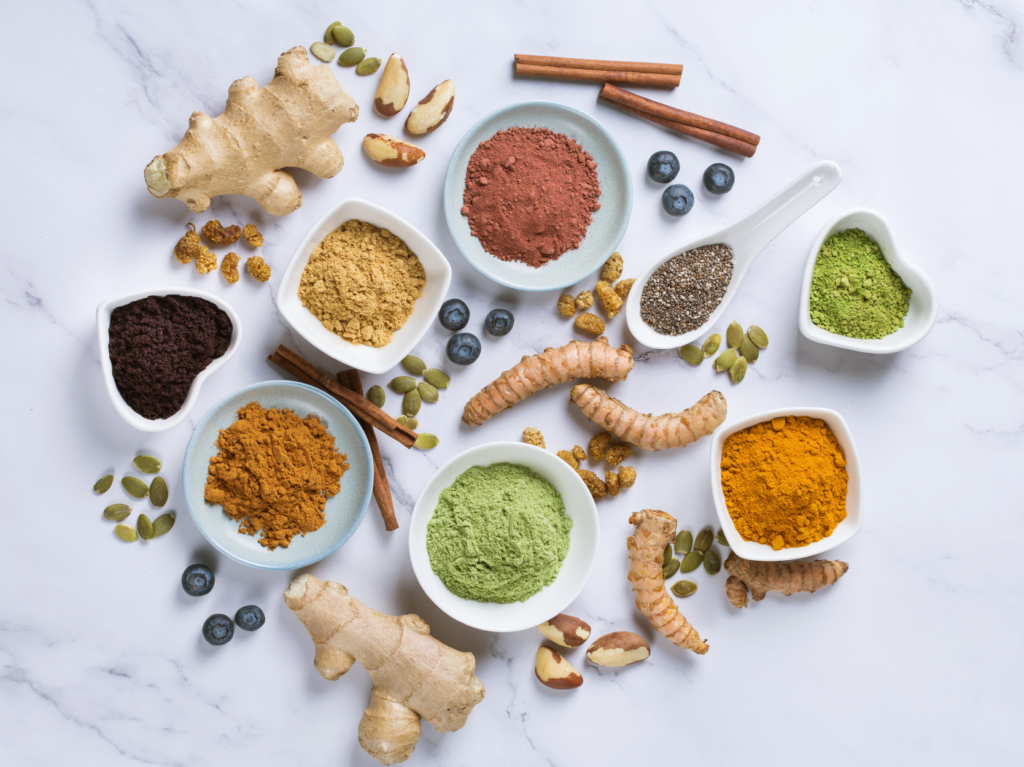Definition of Superfoods
Superfoods are nutrient-dense foods considered to be especially beneficial for health and well-being. These foods are packed with vitamins, minerals, antioxidants, and other essential nutrients that can help support various bodily functions and prevent diseases.
Importance and Benefits of Superfoods

The concept of superfoods is not just a marketing gimmick; it’s grounded in scientific research that highlights the numerous health benefits these foods provide. From boosting immunity to enhancing brain function, superfoods play a vital role in maintaining overall health.
Overview of the Article
In this comprehensive guide, we’ll explore what superfoods are, their nutritional profiles, health benefits, and how to incorporate them into your diet. We’ll also address common myths and provide insights from experts.
Understanding Superfoods
What Qualifies as a Superfood?
A superfood is typically recognized for their high nutrient density and health benefits. Foods like blueberries, kale, and quinoa are often categorized as superfoods because they are rich in antioxidants, fiber, and essential nutrients.
Historical Perspective on Superfoods

The use of nutrient-dense foods for health benefits dates back centuries. Ancient civilizations, including the Greeks and Romans, utilized foods like honey, garlic, and olives for their medicinal properties.
Categories of Superfoods
Fruits
Berries (Blueberries, Strawberries)
Berries are rich in antioxidants, particularly anthocyanins, which are known to reduce oxidative stress and inflammation.
Citrus Fruits (Oranges, Lemons)
Citrus fruits are high in vitamin C, which boosts the immune system and enhances skin health.
Vegetables
Leafy Greens (Spinach, Kale)
Leafy greens are packed with vitamins A, C, and K, along with folate and iron, supporting bone health and reducing the risk of chronic diseases.
Cruciferous Vegetables (Broccoli, Cauliflower)
Cruciferous vegetables contain compounds like sulforaphane, which have been shown to have cancer-fighting properties.
Nuts and Seeds
Almonds, Walnuts
Nuts are a great source of healthy fats, protein, and fiber. Walnuts, in particular, are high in omega-3 fatty acids.
Chia Seeds, Flaxseeds
These seeds are rich in omega-3 fatty acids, fiber, and various micronutrients, supporting heart health and digestion.
Whole Grains
Quinoa, Brown Rice
Whole grains provide essential fiber, vitamins, and minerals. Quinoa is also a complete protein, containing all nine essential amino acids.
Oats, Barley
Oats and barley are high in soluble fiber, which can help reduce cholesterol levels and improve heart health.
Legumes
Lentils, Chickpeas
Legumes are excellent sources of protein, fiber, and iron, making them ideal for vegetarian and vegan diets.
Black Beans, Kidney Beans
Rich in protein and fiber, these beans support digestive health and provide sustained energy.
Fish and Seafood
Salmon, Sardines
Fatty fish like salmon are high in omega-3 fatty acids, which are crucial for brain health and reduce inflammation.
Seaweed, Spirulina
Seaweed and spirulina are nutrient powerhouses, providing a range of vitamins, minerals, and antioxidants.
Dairy and Eggs
Greek Yogurt, Kefir
These probiotic-rich foods support gut health and provide high-quality protein.
Eggs, Cheese
Eggs are a complete protein and contain essential nutrients like choline. Cheese, in moderation, provides calcium and protein.
Herbs and Spices
Turmeric, Ginger
Turmeric contains curcumin, a powerful anti-inflammatory compound. Ginger aids in digestion and has anti-nausea effects.
Garlic, Cinnamon
Garlic has antibacterial properties and can boost the immune system. Cinnamon helps regulate blood sugar levels.
Nutritional Profile of Superfoods
Vitamins and Minerals
Superfoods are rich in essential vitamins and minerals like vitamin C, vitamin A, magnesium, and potassium, which are crucial for various bodily functions.
Antioxidants
Antioxidants in superfoods help combat oxidative stress and reduce the risk of chronic diseases.
Fiber Content
High fiber content in superfoods aids in digestion, helps maintain healthy cholesterol levels, and supports weight management.
Healthy Fats
Healthy fats, such as those found in nuts and fish, are important for brain health and reducing inflammation.
Health Benefits of Superfoods
Boosting Immunity
Superfoods like citrus fruits and garlic are known to strengthen the immune system and help the body fight off infections.
Reducing Inflammation
Anti-inflammatory foods like turmeric and leafy greens help reduce inflammation, which is linked to many chronic diseases.
Enhancing Brain Function
Omega-3 rich foods like salmon and walnuts support cognitive function and may reduce the risk of neurodegenerative diseases.
Supporting Heart Health
Foods high in healthy fats, fiber, and antioxidants, such as oats and berries, promote heart health by lowering cholesterol and blood pressure.
Promoting Digestive Health
Probiotic-rich foods like kefir and high-fiber foods like legumes support a healthy gut microbiome and improve digestion.
Managing Weight
Superfoods are often low in calories and high in nutrients, making them ideal for weight management and preventing obesity.
Superfoods and Disease Prevention
Cancer Prevention
Superfoods like cruciferous vegetables and berries contain compounds that have been shown to reduce the risk of cancer.
Diabetes Management
Foods with a low glycemic index, such as whole grains and legumes, help manage blood sugar levels and prevent diabetes.
Cardiovascular Disease
Consuming heart-healthy superfoods like fatty fish and nuts can reduce the risk of cardiovascular diseases.
Osteoporosis
Calcium-rich foods like dairy products and leafy greens support bone health and prevent osteoporosis.
Eye Health
Superfoods rich in vitamin A and antioxidants, such as carrots and spinach, help maintain good vision and prevent eye diseases.
Incorporating Superfoods into Your Diet
Breakfast Ideas
Smoothie Recipes
Create nutrient-packed smoothies using berries, spinach, chia seeds, and Greek yogurt for a powerful start to your day.
Superfood-packed Breakfast Bowls
Combine quinoa, fruits, nuts, and seeds in breakfast bowls for a balanced meal.
Lunch and Dinner Ideas
Salads and Grain Bowls
Mix leafy greens, whole grains, legumes, and a variety of vegetables for a hearty and nutritious meal.
Superfood-rich Soups and Stews
Incorporate beans, leafy greens, and lean proteins into soups and stews for a comforting and healthful dish.
Snacks and Desserts
Nut and Seed Bars
Prepare homemade bars with nuts, seeds, and dried fruits for a quick and healthy snack.
Superfood-infused Desserts
Use ingredients like dark chocolate, berries, and nuts to create delicious and nutritious desserts.
Challenges and Misconceptions
Common Myths about Superfoods
Dispelling myths such as “superfoods are a cure-all” and understanding that they are part of a balanced diet.
Accessibility and Cost Issues
Addressing the higher costs and availability of superfoods and offering affordable alternatives.
Balancing Superfoods with a Balanced Diet
Emphasizing the importance of a varied diet that includes a range of nutrients from different food groups.
Superfoods for Specific Diets
Vegan and Vegetarian Diets
Highlighting plant-based superfoods like lentils, quinoa, and leafy greens that provide essential nutrients for vegetarians and vegans.
Paleo and Keto Diets
Identifying superfoods like avocados, nuts, and fatty fish that fit well into Paleo and Keto dietary plans.
Gluten-Free Diets
Superfoods like quinoa, chia seeds, and fruits are naturally gluten-free and beneficial for those with gluten sensitivities.
Personal Stories and Testimonials
Real-life Success Stories
Sharing testimonials from individuals who have experienced health improvements by incorporating superfoods into their diets.
Expert Opinions and Insights
Featuring quotes and advice from nutritionists and dietitians on the benefits of superfoods.
Conclusion
Superfoods are nutrient-dense foods that offer a range of health benefits, from boosting immunity to preventing chronic diseases.
Frequently Asked Questions
Superfoods like chia seeds, berries, and leafy greens are excellent for weight loss due to their high fiber and nutrient content.
While superfoods are nutrient-dense, they may not completely replace the need for supplements, especially in cases of specific nutrient deficiencies.
Most superfoods are safe and beneficial for children and pregnant women, but it’s important to consult with a healthcare provider.

